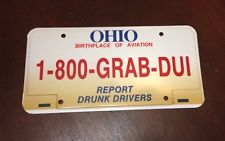 The special license plates for DUI offenders are commonly referred to as “party plates” and “family plates”. The official term in Ohio is “restricted license plates”. Whatever you call them, nobody wants them. In Ohio, the plates are yellow with red lettering, and they signal to everybody the driver of that vehicle was convicted of DUI (called ‘OVI’ in Ohio). This article explains when the plates are required, how they are obtained, and possible penalties for restricted plate violations.
The special license plates for DUI offenders are commonly referred to as “party plates” and “family plates”. The official term in Ohio is “restricted license plates”. Whatever you call them, nobody wants them. In Ohio, the plates are yellow with red lettering, and they signal to everybody the driver of that vehicle was convicted of DUI (called ‘OVI’ in Ohio). This article explains when the plates are required, how they are obtained, and possible penalties for restricted plate violations.
Ohio Law For Restricted License Plates
Ohio law for restricted plates in OVI cases can be confusing because the variables for OVI sentencing are found in multiple statutes. The primary OVI sentencing statute, Ohio Revised Code section 4511.19(G), does not mention restricted plates. That section does provide for license suspensions as part of the OVI sentence. According to that section, the license suspension for a first offense within ten years is one year to three years, and the license suspension for additional OVI convictions within ten years is increasingly longer. That section does not address limited driving privileges.
Limited driving privileges are addressed in Ohio Revised Code section 4510.021. That section lists the reasons for which driving privileges may be issued. However, that section also does not mention restricted plates.
When Are Restricted Plates Required
Restricted license plates are addressed in Ohio Revised Code section 4510.13. That section requires restricted plates as a condition of driving privileges when a person’s license is suspended, “under division (G)(1)(c), (d), or (e) of section 4511.19 of the Revised Code, under division (G)(1)(a) or (b) of section 4511.19 of the Revised Code for a violation of division (A)(1)(f), (g), (h), or (i) of that section, or under section 4510.07 of the Revised Code”.
What does that mean? It means restricted plates are required, as a condition of driving privileges, for the following convictions:
- First or second offense within ten years AND a high breath/blood/urine test (.170 BAC or higher)
- First or second offense within ten years AND a breath/blood/urine test refusal AND a prior OVI conviction within 20 years
- Third offense (or more) within ten years
For those OVI convictions in which restricted license plates are not required, the judge has the option of ordering the use of restricted plates as a condition of driving privileges.
As restricted plates are a condition of limited driving privileges, a person with a qualifying conviction does not have to obtain them if they are not requesting driving privileges. If that person wants driving privileges, however, they must obtain restricted plates.
Obtaining Restricted License Plates
To obtain restricted license plates, a person must complete this form: Application for Registration of a Motor Vehicle with Restricted License Plates (Ohio BMV Form 4808). The completed form is submitted to the court imposing the sentence. An authorized court official completes a portion of the form and returns it to the person. The person takes the completed form to an Ohio BMV Registrar office and obtains the restricted plates.
Penalties for Violating Restricted Plate Requirements
A person whose driving privileges are conditioned on the use of restricted plates and who operates a vehicle without restricted plates could be charged with Driving Under OVI Suspension under Ohio Revised Code section 4510.14. The mandatory penalties for the violation include a jail term of three days to six months, a license suspension for up to one year, a fine of $250 to $1,000, and vehicle immobilization for 30 days. Additional convictions within six years lead to harsher penalties.
Ohio’s Scarlet Letter
As the restricted plates are yellow with red lettering, they have been referred to as “Ohio’s Scarlet Letter”. It would be worse if the letters were blue, as the plates would then have the colors of the University of Michigan.
 Columbus OVI/DUI Attorney Blog
Columbus OVI/DUI Attorney Blog

